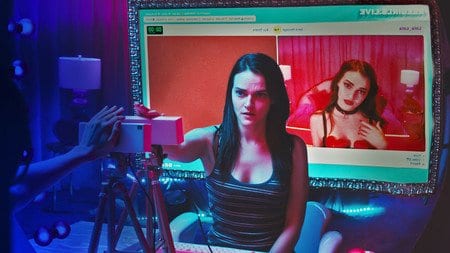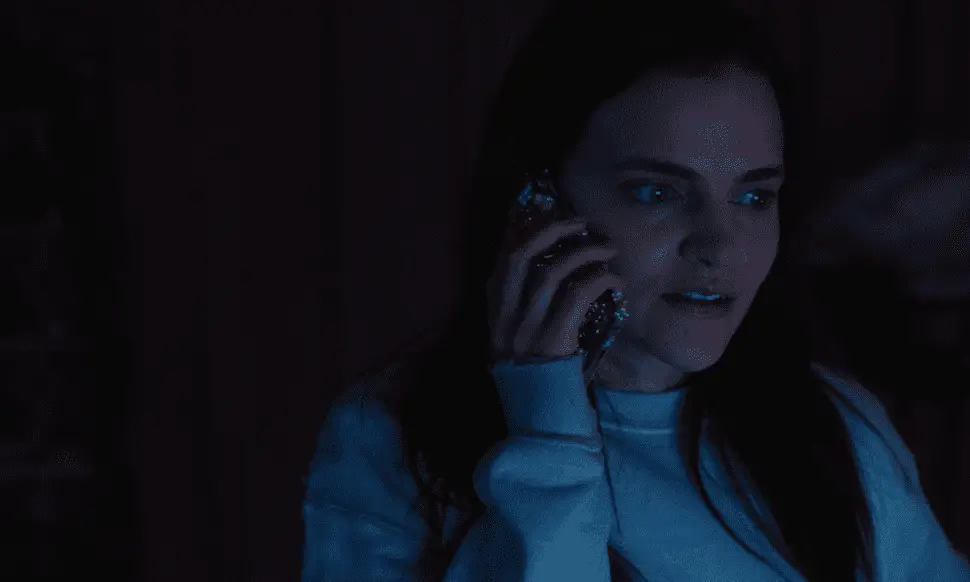The idea of the live camgirl has never had much appeal to me, and so I have pretty much no experience with the world in which Cam spends so much time. Perhaps if I did, the film would have done more for me, but there are certainly elements that pertain to our online lives more broadly; how social media, e.g., can lead us to create, and curate, digital versions of ourselves for the world to consume. The virtual self can come to feel (or maybe even be) more real than the actual self of flesh and blood. It gets more exposure, after all, and is perhaps more related to how others conceive of you than how you are IRL.
When Jean-Paul Sartre famously suggested that “hell is other people” this is a large part of what he meant. It’s not (just) that other people are annoying, or something like that, but that others have a perspective on me that I do not. Each person I know, or encounter, experiences me in a way that I not only do not but cannot. And if existence precedes essence, it is illegitimate to claim that the “true me” is the one alone in a dark room. No; you may not know me better than I do, but you know me differently, and in a way that I can’t access. Thus the old dictum—“know thyself”—is destined to a sort of tragic failure.

One thing that is laudable about Cam is that it presents sex work as precisely that—work. When I said before that I’d never been drawn to webcams, I didn’t mean to imply that I am some kind of prude or even someone who casts negative judgments about porn. There are certainly problems pertaining to exploitation and the like—which Cam also hits upon well—but, at the end of the day, if someone has freely decided to make a living in this way, who are we to judge? Let he who is without sin cast the first stone, and all of that. Jesus was friends with prostitutes.
Yet, those negative societal judgments are on display in the film: from the graffiti on Alice’s mother’s house to the way the cops treat her when she tries to report that her identity has been stolen. “What’s the weirdest thing you’ve ever had to do?” one of the cops asks, which Isa Mazzei notes robs Alice of her agency. She doesn’t have to do anything; she chooses to. Alice has rules—which include never going public or telling the men who watch her stream that she loves them—and it is the fact that her digital doppelganger breaks those rules that bothers her as much as anything else.
I take it that this is what Cam wanted to do: get us to empathize with our sex worker protagonist, Alice, and then with her horror as she finds that her identity has been stolen, making a broader point about the intersection between our digital and actual lives along the way.
It, unfortunately, failed a bit for me on the first front. Not that I felt anything negative towards Alice, really; I just never felt truly invested in her as a character. Instead, the first 30 minutes of the film felt rather boring. It’s all about her trying to increase her ranking, which I struggled to connect to. Perhaps they should have had her save a cat or something.
It is the latter bit—the crux of the film—though, that made me more interested in watching. I’ve seen some articles calling this movie Lynchian, and comparing it to Black Mirror. I think the former is totally unwarranted, but the latter makes sense. In fact, I think this story might have been better presented in that sort of form: cut the opening 30 minutes down to five, tighten the whole thing up, and I think this could have been a really good Black Mirror episode.
Instead, it feels padded. But that’s a criticism I could make of an untold number of films, so something there may relate to my personal preferences. Give me Gremlins 2, where we get right to it, any day of the week, as opposed to all of these films that spend the whole first act stage setting.
In terms of the content, Cam tries to do something interesting. Our friend Alice strives to break the top 50 on her webcam site, where she performs under the account name Lola, only to have it stolen from her once she does. The customer service rep doesn’t help, and this brings out the extent to which the bureaucracy that pervades our (post)modern life can be so frustrating. She knows—and we know— that her identity has been stolen, and yet no one will help her. It’s horrifying, but also something all of us have probably had some experience with—that person on the phone who simply refuses to understand the truth of what you’re dealing with.

Her doppelganger breaks her rules, by (amongst other things) going public. This leads to her brother’s friends finding the feed, and so on. This is the horror; a horror about one’s privacy being broken, and about one’s online life becoming more real than one’s actual life. It gets out of Alice’s control. It’s never explained how all of this works, though, and while I can see the argument that this is a strength of the film, I can’t help but seeing it as a weakness.
Some weird thing happened, which involved Alice’s webcam identity being stolen, and while Tinker says he could see it coming, it is never explained. It’s not entirely implausible, so that’s OK, in principle, but in light of the lack of explanation of just what happened to her, I struggle to understand why Alice returns to the game at the end of the film.
This strikes me as her returning to a cycle of exploitation, while the general thrust of the film works in the opposite direction, characterizing her work as work. Insofar as we don’t know what happened, there seems to be every chance that it will happen again. Perhaps this relates, though, to how (virtually) all of us allow ourselves to be basically exploited by social media sites on a regular basis, and continue to do so even though we know that our privacy is being invaded, our data sold, and that there is always a risk of some kind of hack. Yet, we keep coming back because this is life now. Pics or it didn’t happen.
Thus, to have one’s online identity hijacked presents a particular (post)modern form of terror. Alice’s patrons think that her doppelganger is her, to the point that Barney accuses her of pretending to be Lola when he sees Lola online during their “date”—he takes the virtual to be the more real reality; the more definitive. And we increasingly live in a world where this is the case. To log in to the website you need to enter a code they send to your phone. Your tweets will be used against you. When you think about it, there isn’t much difference between being a camgirl like Alice and curating an Instagram page.
Who am I? Am I defined more by how I am right now as I sit here alone, or by how I am with friends? With family? With whom, exactly, since I’m sure I am not the same with everyone? Or am I perhaps now most defined through my online presence? It is arguably through the latter than I am most known, after all, or at least known by the most.
Yet, I’m enough of an old Luddite to not be terribly worried about that, personally. Perhaps this is why it didn’t do as much for me as it may for others.

